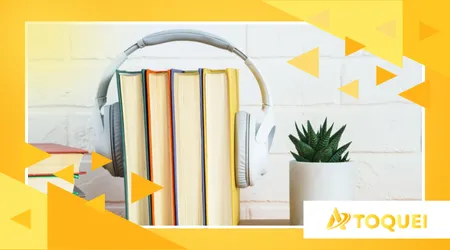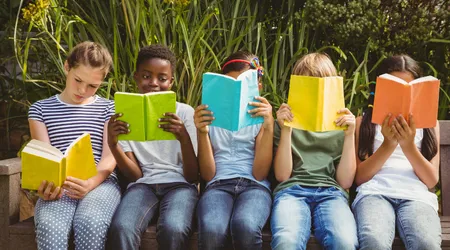The best children's books about music to stimulate creativity

Melody has immense power. Integrating it into childhood reading opens doors to imagination. The best children's books about music contribute to this.
Advertisements
Sound and story create powerful neural connections. This fosters boundless creativity in children. The fusion of these universes is a precious gift.
After all, music is a universal language. Its presence in books enriches the narrative experience. Children learn about rhythm, harmony, and culture.
This early exposure fosters their innate artistic sensitivity. It's an investment in their future.
How Does Reading Musical Books Shape a Child's Mind?
Reading activates brain areas responsible for empathy. Adding a musical component amplifies this effect.
Advertisements
A child's brain processes information comprehensively. They not only read but also "listen" to the story. Cognitive development is significantly boosted.
This type of book acts as a catalyst. It transforms abstract ideas into concrete forms. The child visualizes the orchestra and imagines the instruments.
This prepares her to solve problems innovatively. Creativity flourishes in this fertile ground.
A 2017 study by Dr. Anita Collins in Australia shows that regular musical training, even if it's playful and at home, improves executive function and language skills in children.
Read more: How to set up a music corner for young children
The best children's books about music: What Titles Are Transforming Home Music Education?
There is a vast repertoire of notable works on the market. Peter and the Wolf, by Sergei Prokofiev, is a timeless classic.
He teaches about instruments and characters in an engaging way. His narrative captivates the attention of younger generations.
Another excellent option is The Book of Sounds, which explores the soundscape. It invites children to identify and imitate different sounds. This sharpens their listening skills and expands their sound vocabulary.
Interactive titles, with buttons that play melodies, are highly sought after. They offer a unique tactile and auditory experience. Fun and learning come together seamlessly.
| Age Range (Years) | Recommended Book Type | Main Focus of the Stimulus |
| 0-2 | Cloth or Bath Books with Simple Sounds | Sound and Rhythm Recognition |
| 3-5 | Works with Instruments and Short Stories | Musical Vocabulary and Imagination |
| 6-8 | Playful Biographies of Composers and Operas | History of Music and General Culture |
Why Invest in Books that Encourage Music From an Early Age?
Imagine the development of creativity as an orchestra. Each instrument needs to be tuned and played at the right time.
++ Difference between electronic and acoustic drums: which is more worthwhile?
Early exposure to music is this tuner. It ensures that all cognitive "instruments" work in harmony.
A child who reads about music develops internal rhythm. This skill positively impacts motor coordination. It also improves the ability to concentrate on other tasks.
To illustrate, think of a child who invents a song. They not only create the lyrics, but also the melody and rhythm.
This is a Original Example of integrated creativity. Reading music books provides the tools for this process.
The best children's books about music They function as little guides. They introduce complex concepts in a light and fun way. The child learns without feeling like they're studying.

What Are the Advantages of Including The best children's books about music in the Reading Routine?
The main benefit is facilitating expression. Music gives voice to feelings that words can't convey. Themed books encourage this emotional expression.
They validate the importance of art in life.
++ Children's songs in other languages
Furthermore, interacting with these books strengthens family bonds. The act of reading and singing together creates lasting memories. This transforms routine into moments of deep connection.
another model is the book that explores the blues. Children learn about the history of the genre. They understand how emotion is transformed into sound art. This broadens their cultural and social horizons.
According to the Brazilian Institute of Geography and Statistics (IBGE), in 2023, more than of families with children aged 0 to 6 said they look for activities that stimulate creativity at home, highlighting music as one of their favorites.
How do Music and Reading Complement Each Other in the Development of Intelligence?
Reading improves language and cognition. Music, in turn, refines listening and logical reasoning. Together, they form a dynamic and powerful pair.
++ 10 books to introduce children to music and orchestras
This combination drives intelligence holistically.
Exposure to The best children's books about music It also teaches discipline. Musical rhythm and structure demand attention. This organization is reflected in the way a child thinks.
After all, if creativity is the act of connecting ideas in new ways, why not use the most effective tools to develop it?
The best children's books about music are undeniably a path. Fun is guaranteed, and the creative future is promising.
Invest in The best children's books about music It's more than just buying an object. It's a portal to a world of possibilities.
The best children's books about music are catalysts of pure imagination. The impact of this on adult life is immeasurable.
Conclusion: What is the Legacy of Presenting Music Through Books?
Presenting music through literature is planting a seed. This seed germinates in the form of creativity and sensitivity.
The result is a more expressive and adaptable individual. The legacy is an open mind ready to innovate.
Frequently Asked Questions
1. What is the ideal age to start reading children's books about music?
There's no minimum age. Cloth or tactile books with simple sounds are excellent for babies. Early exposure is always beneficial for auditory development.
2. Can music reading replace formal music lessons?
No, reading doesn't replace formal education. It serves as an excellent complement. Books build the theoretical foundation and stimulate practical interest.
3. How do I choose the right book for my child's age group?
Choose books with appropriate language and themes. Interactive books with vivid illustrations captivate younger children. Stories about composers are ideal for older children.
4. Where can I find updated suggestions for children's books about music in 2025?
Search specialized news sites. Education blogs and children's bookstores also maintain updated lists. Check reviews from parents and educators.
